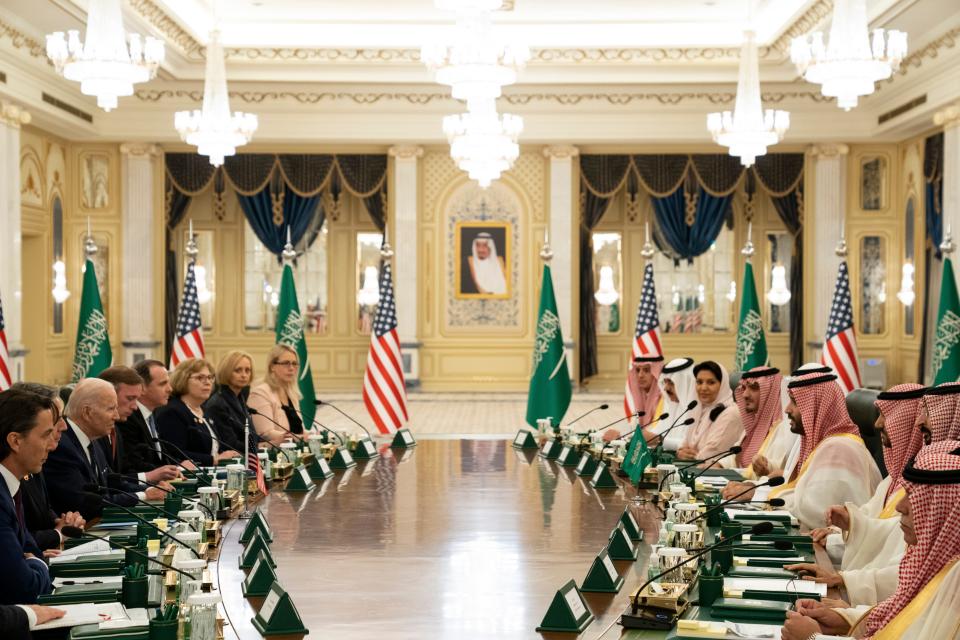Biden is pressing the Saudis to increase oil production. Experts say the kingdom isn't likely to agree
- Oops!Something went wrong.Please try again later.
- Oops!Something went wrong.Please try again later.
JEDDAH, Saudi Arabia – President Joe Biden heads into another round of meetings with leaders of oil-producing nations on Saturday amid concerns that gas prices are pushing inflation to its highest levels in 40 years.
"I'm doing all I can to increase the supply for the United States of America, which I expect to happen," Biden said Friday.
But experts say the Saudis may not be willing to commit to producing more oil – or that they even have the capacity to do so.
The latest:
Royal meetings: Biden held meetings with King Salman bin Abdulaziz al Saud and Crown Prince Mohammed bin Salman upon arriving in Saudi Arabia on Friday. Biden said they had a good discussion on stabilizing global energy security and adequate oil supplies to support global economic growth.
No announcement: National Security Adviser Jake Sullivan lowered expectations for any immediate boost to oil production. "I don't think you should expect a particular announcement here," he said, adding that any progress would probably be measured "over the course of weeks" and come via the OPEC+ group of oil-exporting nations.
Sense of urgency: Biden said Saudi leaders share his sense of urgency to improve energy security. "Based on our discussions today, I expect we'll see further steps in the coming weeks," he said.
What’s about to happen?
Biden will take part in a Saturday gathering of leaders from the Gulf Cooperation Council – Bahrain, Kuwait, Oman, Qatar, Saudi Arabia and the United Arab Emirates – before returning to Washington.
He also will meet one-on-one with the leaders of Iraq, Egypt and the United Arab Emirates.

Why it matters
Biden is under pressure to get oil-producing nations to open the spigot after U.S. inflation jumped to a 40-year high in June. The spike was fueled by the high cost of gas, food and rent.
Gas prices have actually been dropping in the United States for several weeks. The average price at the pump on Friday was $4.57 a gallon after hitting a high of $5 a gallon in June. But the lower prices are not reflected in the latest inflation numbers, released earlier this week because that data reflects consumer costs in June.
What they are saying
Experts question whether the Saudis have the desire or the capacity to produce more oil.
“The Saudis have been talking a good game about getting up to something like 12 million barrels per day,” said Paul Pillar, nonresident senior fellow at Georgetown University’s Center for Security Studies. “They're currently producing at around not quite 10½. There is good reason to believe that they couldn't do anything like 12 million barrels per day for any sustained length of time.”
Saudi Arabia wants to keep managing the global oil market through the OPEC oil cartel rather than acting on its own, according to Ben Cahill, an energy security expert at the Center for Strategic and International Studies. While Saudi Arabia is the de facto leader of the OPEC+ group of oil exporting countries, acting in tandem has helped the oil-rich kingdom navigate a huge amount of volatility in the market in recent years.
“They don’t want to go it alone,” Cahill said. “Maintaining cohesion within the group is really a critical priority for them.”
OPEC and its allied producers announced in June that they would increase production by 200,000 barrels a day in July and August.
"The Saudis are reluctant to come out with a clear statement that the oil will be increased" beyond those previous steps, Martin Indyk, a former U.S. ambassador to Israel, said during an interview on the Israel Policy Pod.
While the Saudis are the only oil-producing exporting country that has excess capacity, they also have an agreement with Russia that places restrictions on output, Indyk said.
Even if Saudi Arabia agrees to increase production, it’s unlikely to immediately lower prices at the pump for American drivers, said Karen Young, an energy expert at the Middle East Institute. “The oil has to be refined into gasoline. That’s really more of an issue inside of our domestic economy,” Young said. “We don’t have refining capacity and we’re not able to meet our gas demand.”
“If the administration is serious about increasing supply, they should be meeting with producers here at home instead of looking to governments overseas,” said Mike Sommers, president and chief executive officer of the American Petroleum Institute, which represents the U.S. oil and gas industry.
Want to know more? Here's what you missed.
INFLATION HITS ANOTHER 40-YEAR HIGH:What does that mean for shoppers and the next Fed rate hike?
WHO'S AT FAULT?Is Biden to blame for higher gas prices? Drivers pay more in 93 countries.
'MOMENT OF CONSEQUENCE': Biden to release up to 180 million barrels of oil from reserve to drive down gas prices
BIDEN IN JERUSALEM: Biden's visit to Israel starts with security issues as US officials fret about Iran's threat
DIVISIONS OVER IRAN: Tensions over Iran nuclear deal disrupt Biden's kumbaya moment in Israel
SAUDI 'CUPABILITY': Biden defends Saudi Arabia visit after Khashoggi murder, says he's 'never been quiet' on human rights
Michael Collins and Maureen Groppe cover the White House. Follow Collins on Twitter @mcollinsNEWS and Groppe @mgroppe.
This article originally appeared on USA TODAY: Biden wants Saudi Arabia to boost production. Will it help gas prices?

